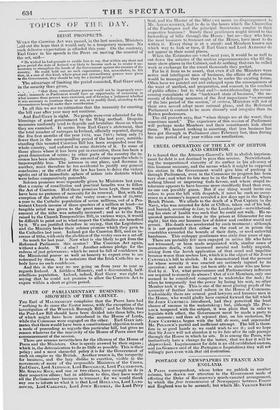CRUEL OPERATION OF THE LAW OF DEBTOR AND CREDITOR.
IT is feared that the Attorney-General's bill to abolish imprison- ment for debt is not destined to pass this session. Notwithstand- ing the unquestioned sincerity of its author in his advocacy of this humane measure, and the means which it might be supposed his station in the Government would give him of pushing it through Parliament, even in the Commons its progress has been very slow ; and what its fate may be in the House of Lords, where nothing liberal or improving finds favour, and where stupid in- tolerance appears to have become more steadfastly fixed than ever, no one can possibly guess. But if any thing would incite our rulers to pass the bill with despatch, it must be such an occur- rence as a coroner's inquest revealed a few days ago in the King's Bench Prison. We allude to the death of a Post Captain in the Navy, who was arrested for debt at Clifton, taken out of his bed, and hurried, according to law, to the London gaol—notwithstand- ing his state of health was such that he could not walk. He re- quested permission to sleep in the prison at Gloucester for one night ; but this our humane law of debtor and creditor would not permit. His death was accelerated by such treatment ; although it is not pretended that either on the road or in prison the constables exceeded the bounds of their duty, or used unlawful harshness. This unhappy gentleman was sixty-four years of age.
There are probably few men engaged in active life who have not witnessed, or been made acquainted with, similar cases of premature death, with increased mental and bodily anguish, arising from the harsh application of that cruel and impolitic because worse than useless law, which it is the object of Sir JOHN CAMPBELL'S bill to abolish. It is demonstrated that the persons for whose security it was enacted are seriously injured by its operation ; and no one has yet been able to show who are bene- fited by it. Yet, what perseverance and Parliamentary influence are required to remedy its abuses! Out of 658 Members, only one seemed to be considered competent to undertake the task; for when he temporarily lost the power by losing his seat, no other Member took it up. This is one of the most glaring proofs of the necessity of further internal reform in the House of Commons. Undoubtedly there are several good lawyers and humane men in the House, who would gladly have carried forward the bill which Sir JOHN CAMPBELL introduced, had they perceived the least chance of success in the undertaking; but, although Mr. POL- LOCK tampered with the subject, it was plain that in order to legislate with effect, the Government must be made a party to
the measure; and thus all rejoiced that, on his reelection, Sir
JOHN CAMPBELL began with the bill de novo, and supersede/ Mr. Por.i.ocx's partial and inefficient attempt. The bill is there-
fore in as good hands as we could wish to see it ; and we hope that Sir JoHN will not abandon it to its fate after its safe passage through the House in which he sits. It is among the Peers, who
instinctively hate a change for the better, that we fear it will be shipwrecked. Imprisonment for debt is an old established custom, and (as GIBBON said of the Portuguese Inquisition) they will not willingly part even with that old institution.




















 Previous page
Previous page